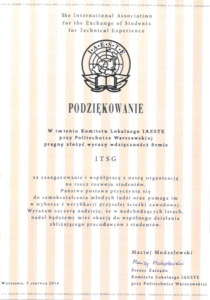6 July 2017
Poland has been pursuing a comprehensive series of education reforms since the early 1990s. Today our country serves as a model in Europe and globally on how to improve education to equip the next generation with real fundamental cognitive skills needed for 21st-century jobs. Still, Poland’s labor market is undergoing profound changes. First, with Poland’s population aging and decreasing in size, fewer workers will have to support more pensioners. Second, technological and structural change in the economics is modifying the requirement for employees.
Among the strengths, there are the Polish economy, high standards of primary and secondary education and a substantial number of graduates.
Excellent universities and technical schools provide a wealth of academic talent
The education system in Poland gives the possibility of 22 years of interrupted, free education, which puts it in 10th position among best education systems in the world, according to MBC Times.
Poland has some old and prestigious colleges – 6 of its universities are in the QS World Ranking 2016-2017, 11 are in the Top 100 for QS Emerging Europe and Central Asia rankings.
The high standards of the Polish school system reveal in some scientific achievements. Polish scientists are well known for: discovering the first extra-solar planetary system, the creation of the technology for the creation of the blue laser, the manufacturing process to make the world’s smallest synthetic diamonds and for the isolation of queen cells from bone marrow. Other notable achievements are the unmanned helicopter and the new prosthetic hand.
Poland’s educational performance has indeed remained stable over the last years, beginning with its endless preoccupation with decreasing the number of early school leavers to 5.3%, one of the lowest rates in EU (European average is 11%). What is more, 93% of Polish students study at least one international language as part of a mandatory language program, which considerably improves their communication abilities later on in their profession. The most frequently studied language in Polish educational institutions is English, followed by German. Furthermore, 10% of all EU university graduates come from Poland each year, out of which 40.000 are ICT students.
The total number of IT students among the total student community is rising since 2010. In 2013 there were over 70 thousand students on IT degree courses in Poland and 14 thousand of graduates. Polish students perform a lot of progress in areas of information technology, a fact confirmed by their outstanding results at prestigious international competitions. The biggest IT academic centers are respectively Warsaw (with 2100 graduates), Cracow (with 1900 graduates) and Wroclaw (1400 graduates).
This could be the main argument for companies involved in establishing their centers in Poland: to access one of the youngest and best-educated societies in Europe. Our country trains around 1,7 million students every year, and almost half a million students graduate higher education institutions annually.
The educational scheme creates a competitive workforce
Polish IT students are developing competencies and receive specialized certificates, which are the “visa” to apply for a job as an expert. Consequently, Polish IT labor market is becoming more and more attractive.
There is a significant internal demand, high standards of education and highly educated labor. With its pool of skilled employees with a first-class education, strong communication skills, and relatively low costs, Poland has possibilities of holding its positions as both a regional and global player, being built as one of the most desirable IT outsourcing locations.
Education background and qualifications of Polish IT specialist are highly recognized. Resources on the labor market increase each year by 15.000 graduates of IT faculty on the university level. The quality of provided service and creativity of Polish IT professionals very frequently exceed employers’ expectations. Each year young Polish information technologies earn the ranking in international programming contests such as Imagine Cup, Code Jam or CEPC Central European Programming Contest.
For many of those who choose to study in Poland, the country’s appeal is augmented by its relatively low living costs, which remain below those of most EU members. For the rest, who want to invest in the Polish market, you should know that the educational systems is improving day by day and has the support of the private sector as well.
Photo source: www.pexels.com





